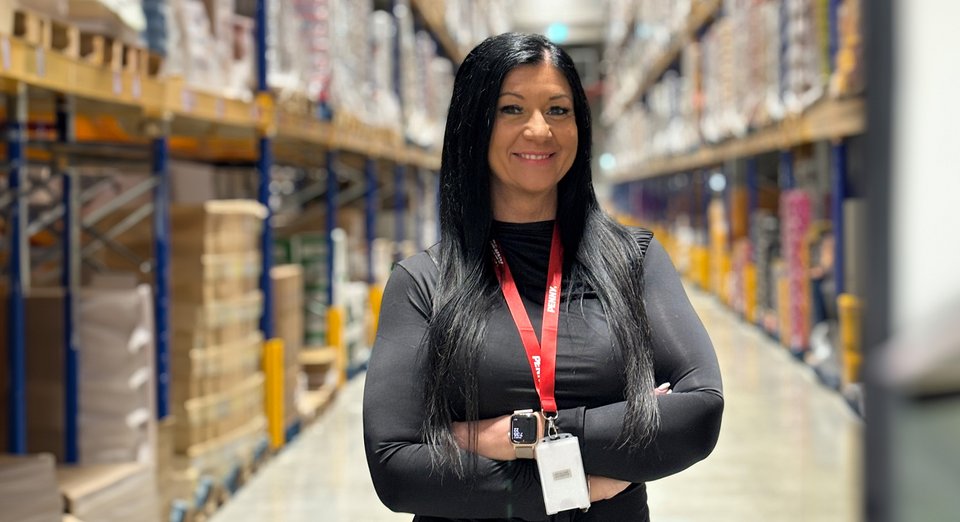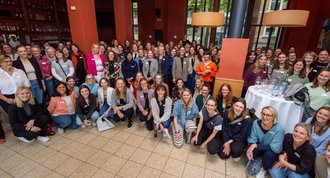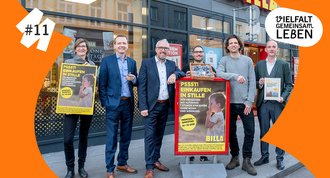
Brigitta Vida manages one of a total of four logistics centres that supply PENNY stores in Hungary. She has been responsible for the warehouse in Karcag, which covers an area of 26,000 square metres and supplies 78 shops, for seven years. As a woman in the traditionally male-dominated field of logistics, she manages 200 employees.
one: How did you manage to make a career in logistics, a classic male domain, and now manage a large logistics centre? Were there any reservations from your male colleagues at the beginning?
Brigitta Vida: I studied to be a German and history teacher, so I'm a career changer. There were certainly reservations on the part of some men at first, but they disappeared relatively quickly. It certainly helped that my position was also previously held by a woman. In this respect, my male colleagues were already used to a woman at the top. My previous experience in the German automotive industry, which is also a classic male domain, also benefited me greatly.
one: What is the general situation regarding the employment of women in Hungary? And what is the situation at PENNY and in logistics?
Brigitta Vida: In Hungary, the employment of women, including in management positions, has generally increased in recent years. But we are still a long way from where we should be. At PENNY Hungary as a whole, we have an above-average proportion of women: more than 70 per cent of employees are women. Logistics is one of the traditional male domains in Hungary. In this area, the proportion of women is 39 per cent, which is already good, but there is definitely room for improvement.
one: What would have to change structurally for more women to pursue careers in classic male domains?
Brigitta Vida: In any case, more childcare facilities would have to be created to enable mothers to work at all. There also needs to be a rethink in society when it comes to traditional role models. In logistics, for example, a woman is in just as good a position as a man. In the warehouse, many work processes such as goods inspection or administrative tasks can be carried out just as well by women as by men. Contrary to popular belief, there are many areas in logistics where physical characteristics play no role at all.
one: What is PENNY doing to enable employees to integrate work and family life?
Brigitta Vida: The integration of job & family plays a key role in the employment of women. It is important for us to cater to the individual needs of women. In order to retain women in our company, we at PENNY offer flexible options for returning to work after parental leave. In a joint project with HR, we are working on accommodating their working hours during the school holidays, which last a full 10 weeks in Hungary in the summer. We have also introduced a programme to support families with life problems such as separation or divorce.
one: How do you feel about PENNY as an employer in terms of women and careers?
Brigitta Vida: As far as career opportunities are concerned, I think PENNY is a very good employer. I myself studied part-time and PENNY gave me a lot of support. In general, PENNY offers a lot of support for women who want to continue their education and further their development.
one: What is the ratio of women to men in your team?
Brigitta Vida: I have 13 senior managers, two of whom are women. I am very open to hiring more female senior managers, as the company can only benefit from this.
About the person
Brigitta Vida was born in Hungary in 1974. After studying history and German as a teacher, she studied TQM (Total Quality Management) and completed an MBA at the Budapest University of Technology and Economics, specialising in HR, quality management and production management. From 1998 to 2017, she held various management positions in the automotive industry. She has been managing the PENNY central warehouse in Karcag since 2017. In addition to her work as a logistics manager, she completed further training as a corporate internal and executive coach at Corvinus University Budapest.
Brigitta Vida manages one of four logistics centres that supply PENNY stores in Hungary. She has been responsible for the warehouse in Karcag, which covers an area of 26,000 square metres and supplies 78 shops, for seven years. As a woman in the traditionally male-dominated field of logistics, she manages 200 employees.
How did you manage to make a career in this classic male domain and now manage a large logistics centre? Were there any reservations from your male colleagues at the beginning?
Brigitta Vida: I studied to be a German and history teacher, so I'm a career changer. There were certainly reservations on the part of some men at first, but they disappeared relatively quickly. It certainly helped that my position was also previously held by a woman. In this respect, my male colleagues were already used to a woman at the top. I also benefited greatly from my previous experience in the German automotive industry, which is also a classic male domain.
What is the general situation regarding the employment of women in Hungary? And what is the situation at PENNY and in logistics?
Brigitta Vida: In Hungary, the employment of women, including in management positions, has generally increased in recent years. But we are still a long way from where we should be. At PENNY Hungary as a whole, we have an above-average proportion of women: more than 70 per cent of employees are women. Logistics is a traditionally male domain in Hungary. In this area, the proportion of women is 39 per cent, which is already good, but there is definitely room for improvement.
What would have to change structurally for more women to make a career in traditionally male domains?
Brigitta Vida: In any case, more childcare facilities would have to be created to enable mothers to work at all. There also needs to be a rethink in society when it comes to traditional role models. In logistics, for example, a woman is in just as good a position as a man. In the warehouse, many work processes such as goods control or administrative tasks can be carried out just as well by women as by men. Contrary to popular belief, there are many areas in logistics where physical characteristics play no role at all.
What is PENNY doing to enable employees to integrate work and family life?
Brigitta Vida: The integration of work and family plays a key role in the employment of women. It is important for us to cater to the individual needs of women. In order to retain women in our company, we at PENNY offer flexible options for returning to work after parental leave. In a joint project with HR, we are working on accommodating their working hours during the school holidays, which last 10 weeks in the summer in Hungary. We have also introduced a programme to support families with life problems such as separation or divorce.
How do you feel about PENNY as an employer in terms of women and careers?
Brigitta Vida: As far as career opportunities are concerned, I think PENNY is a very good employer. I myself studied part-time and PENNY gave me a lot of support. In general, PENNY offers a lot of support for women who want to continue their education and further their development.
What is the ratio of women to men in your team?
Brigitta Vida: I have 13 managers, two of whom are women. I am very open to hiring more female managers, because the company can only benefit from this.
About the person
Brigitta Vida was born in Hungary in 1974. After studying history and German as a teacher, she studied TQM (Total Quality Management) and completed an MBA at the Budapest University of Technology and Economics, specialising in HR, quality management and production management. From 1998 to 2017, she held various management positions in the automotive industry. She has managed the PENNY central warehouse in Karcag since 2017. In addition to her work as logistics manager, she completed further training as a corporate internal and executive coach at Corvinus University Budapest.
Translated with deepL / Translated by deepL












